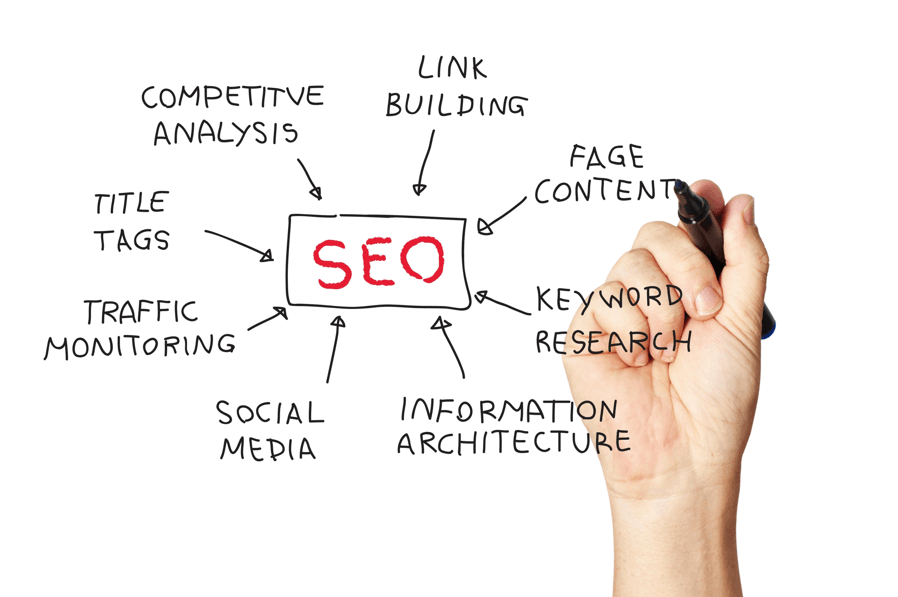Contact Us Today for a
Comprehensive Analysis and Strategy Session.
Ready to level up your online game? Call (844) 200-6112 or dive into the form below.
Embrace the future of collaboration with OmniFunnel's Oculus 2 VR headset offer for valued clients. It's your entry into immersive VR meetings in the metaverse, redefining digital meetings and shaping virtual collaboration in the realm of web3.
Mastering keyword strategy is essential for successful SEO campaigns. To truly understand this mastery, it's important to know the difference between short-tail and long-tail keywords.
Short-tail keywords are broad search terms that are usually 1-3 words long. Examples include "running shoes" or "digital marketing." These keywords have a wide reach, attracting a large number of searches but also facing tough competition.
Long-tail keywords are more specific phrases that consist of more than three words. For instance, "best running shoes for marathon training" or "digital marketing agency for small businesses." These targeted keywords attract highly qualified traffic with clear intent.
Using both types of keywords strategically can greatly improve your SEO performance:
In this guide, we will explore:
Knowing when and why to use each type of keyword can elevate your basic SEO tactics into powerful digital marketing tools. Are you ready to unlock the full potential of your keyword strategy? Let's dive deeper into the world of short-tail and long-tail keywords.
Furthermore, leveraging AI can significantly enhance your keyword strategy. Our Definitive Guide to AI Workflows offers valuable insights on how to streamline and automate your digital business, which can be particularly beneficial when implementing your SEO strategies.
Additionally, exploring our case studies could provide you with proven results and actionable insights that could further optimize your approach towards mastering keyword strategy.

Keywords are the foundation of effective SEO strategies. They come in different categories, each serving a specific purpose in digital marketing. In this section, we'll explore these essential keyword types and how they can be used strategically.
Search engines have evolved to understand context and user intent through semantic analysis. This means that keywords now need to align with:
To stay ahead of these changes, it's crucial to incorporate machine learning into your SEO strategies. These AI-driven insights can significantly enhance your keyword research, content optimization, and link-building efforts.
The relationship between keyword length and search intent follows a clear pattern:
Modern SEO success requires a strategic mix of these keyword types, carefully balanced to match user intent at different stages of the customer journey. Search algorithms prioritize content that naturally incorporates diverse keyword variations while maintaining contextual relevance.
In this evolving landscape, one might wonder if SEO is dying out soon. However, rather than disappearing, SEO is transforming. Understanding this transformation will be key to optimizing your website for the new era of search.
Moreover, as we delve deeper into the realm of digital marketing, strategies like omnifunnel marketing are becoming increasingly important. These innovative approaches blend visual, textual, and interactive elements to create more immersive experiences that engage audiences effectively.
Lastly, advancements such as Microsoft's new Co-Pilot Studio, which combines generative AI with business needs through plugin actions, are set to revolutionize how we approach SEO and digital marketing in general.
Short-tail keywords are the fundamental elements of an SEO strategy. These brief search terms usually consist of 1-3 words and focus on broad subjects or product categories. Examples include "running shoes," "pizza delivery," or "digital marketing." While these keywords have a high search volume, they also face strong competition.
Short-tail keywords are particularly effective in certain marketing situations. Brand awareness campaigns use these terms to attract top-of-funnel traffic and establish a presence in the market. E-commerce category pages often focus on head terms like "men's watches" or "laptop computers" to appeal to shoppers who are just browsing.
Short-tail keywords are effective at driving large amounts of traffic, making them ideal for:
These head terms are also crucial for pay-per-click (PPC) campaigns, where businesses compete for prominent ad placements. Major brands allocate significant budgets to short-tail keywords because they understand the importance of maintaining visibility in the market and supporting long-term SEO goals.
A successful strategy combines short-tail targeting with strong content development. While these keywords may generate a high number of impressions, success ultimately relies on providing valuable content that meets various user intents and directs visitors towards more specific offerings.
As we look ahead, it's important to stay proactive by embracing upcoming trends in digital marketing. For example, the top digital marketing trends for 2024 include social commerce, AI-driven marketing, and personalized customer experiences - all of which can significantly impact keyword strategy and usage.
Additionally, gaining insights into how major tech companies like Google and Meta utilize user data can help refine SEO strategies. A comprehensive guide on big tech's data-sharing policies reveals how user data is collected and stored, providing valuable information on how this data can be used for more targeted SEO efforts.

Long-tail keywords are specific search phrases that contain four or more words. Unlike broader keywords, which may attract a wide range of visitors, long-tail keywords are highly targeted and reflect the exact intent of the user. This makes them valuable for driving qualified traffic to websites.
For example, instead of targeting the generic keyword "running shoes," a long-tail approach would focus on something more specific, like "best waterproof running shoes for trail marathons." By using such detailed phrases, businesses can attract users who are actively looking for exactly what they offer.
Long-tail keywords excel in conversion optimization due to their specificity. When users search with detailed phrases like "organic gluten-free pizza delivery Manhattan," they demonstrate clear purchase intent. This targeted approach yields conversion rates up to 2.5x higher than short-tail alternatives.
The power of long-tail keywords lies in their strategic advantages:
Long-tail keywords shine in niche markets. A boutique fitness studio might target "prenatal yoga classes Upper East Side" rather than competing for "yoga classes." This targeted approach connects businesses with their ideal audience segments through search intent alignment.
Search algorithms increasingly favor comprehensive content addressing specific user queries. Long-tail keywords enable content creators to develop in-depth resources that satisfy searcher intent while building topical authority in their respective niches.
Moreover, leveraging OmniFunnel Marketing can further enhance the effectiveness of long-tail keyword strategies by maximizing results and engaging customers synergistically.
The distinct characteristics of short-tail and long-tail keywords create unique opportunities and challenges in SEO strategy. Here's a detailed analysis of their key differences:
These distinctions shape how businesses allocate their SEO resources and structure their content strategies. The choice between short-tail and long-tail keywords depends on specific marketing objectives, available resources, and target audience behavior patterns. For instance, when considering the cost to market an app, it's crucial to understand these keyword dynamics as they significantly influence your overall marketing strategy.
A strategic blend of short-tail and long-tail keywords creates a robust SEO foundation. Here's how to leverage each type effectively:
Use short-tail keywords during:
Deploy long-tail keywords for:
Short-tail content performs well on:
Long-tail content excels in:
The key lies in creating content clusters where short-tail keywords act as central themes, while long-tail variations branch out into specific subtopics. This approach satisfies both broad market visibility and targeted conversion opportunities.

AI-powered keyword research tools are changing the way marketers find and analyze search terms. These advanced platforms use AI and machine learning algorithms, such as those offered by OmniFunnel's DeepML, to discover valuable keyword opportunities across various search intent categories.
Answer The PublicVisualizes question-based search queries.
KeywordTool.ioExtracts autocomplete suggestions across various platforms.
SemrushProvides keyword gap analysis and competitive intelligence.
Ahrefs: Offers keyword difficulty scores and traffic potential estimates.
The latest AI algorithms evaluate:
These advanced techniques enable marketers to build comprehensive keyword strategies that capture both immediate opportunities and emerging search trends. The combination of machine learning with traditional keyword research methods creates a data-driven approach to optimizing content.
To fully leverage the potential of these AI tools for business growth, it's important to understand how to make AI tools work for you. Additionally, implementing advanced SEO tactics tailored for e-commerce businesses can greatly enhance online visibility and drive sales. Furthermore, utilizing AI-enhanced marketing automation services can streamline operations, personalize campaigns, and increase productivity.
Strategic keyword integration demands a delicate balance between search optimization and natural readability. A well-crafted content strategy incorporates both short-tail and long-tail keywords through these proven methods:
The key lies in creating value-driven content that serves user intent while incorporating keywords strategically. This approach satisfies both search engines and human readers, leading to improved rankings and engagement metrics.
A robust content optimization strategy also considers user experience factors:
These elements work together to create content that ranks well and provides genuine value to your target audience.
In addition to these strategies, it's essential to consider the rise of voice search. Adapting your content for voice search can significantly enhance your reach, as more users turn to voice-activated assistants for information.
Moreover, leveraging AI in your marketing strategies can transform your approach towards lead generation, personalization, and content creation. This is part of a larger trend where businesses are harnessing the power of AI to optimize their digital marketing efforts across various channels.
Finally, refining your Google Ads bid strategies can also play a crucial role in maximizing your online visibility. Learning how to optimize your Google Ads campaign with refined bid strategies will help you stay ahead in the competitive digital advertising landscape.

Effective keyword performance tracking requires a strategic combination of metrics and tools to evaluate ROI and optimize search visibility. Here's a comprehensive breakdown of essential measurement components:
ROI = (Revenue from Keywords - Keyword Investment) / Keyword Investment x 100
Implementing A/B testing for keyword variations helps refine targeting strategies and improve conversion rates. Regular performance audits using these metrics enable data-driven optimization decisions and better resource allocation between short-tail and long-tail keyword campaigns.
In addition to these SEO strategies, leveraging the expertise of a PPC management agency can further enhance online advertising success. These agencies play a multifaceted role in crafting and optimizing campaigns that drive targeted traffic, enhance online visibility, and deliver measurable ROI.
The evolution of search algorithms and user behavior patterns signals transformative changes in keyword strategy. AI-powered search engines now understand context, intent, and semantic relationships with unprecedented accuracy.
The rise of OmniFunnel SEO approaches combines traditional keyword targeting with cross-channel optimization. This strategy acknowledges the interconnected nature of user searches across devices and platforms.
Search engines' growing sophistication demands a more nuanced approach to keyword strategy. The traditional boundaries between short-tail and long-tail keywords blur as algorithms better understand context and user intent. Successful SEO strategies adapt by embracing these technological advances while maintaining focus on delivering value through high-quality, relevant content.
As we look ahead to 2024, it's essential to consider emerging growth hacks that can transform businesses. Incorporating AI, affiliate marketing, and innovative PR strategies into our keyword strategies will be crucial. Additionally, adapting PR strategies from last year to align with evolving consumer behavior and technological advancements will be key for future success, as highlighted in our recent blog post about PR strategies.
Using both short-tail and long-tail keywords strategically is crucial for SEO success. Each type of keyword has its own specific role in the world of digital marketing:
Short-tail keywords:
Long-tail keywords:
A well-rounded keyword strategy combines both types to create a comprehensive SEO plan. Short-tail keywords establish a broad market presence, while long-tail variations refine targeting and drive conversions. This two-pronged approach allows businesses to:
The future of optimizing keywords lies in understanding user intent and providing value through targeted content. Successful SEO practitioners will use advanced analytics, AI-powered tools, and in-depth market insights to fine-tune their keyword strategies. By mastering the skill of selecting and placing keywords, businesses can create impactful digital experiences that resonate with their target audience and deliver meaningful results.
Short-tail keywords are typically 1-3 words with broad intent and high search volume, making them ideal for brand awareness and top-of-funnel targeting. Long-tail keywords consist of more than 3 words, are more specific, have lower competition, and tend to yield higher conversion rates by targeting niche audiences with clear purchase or action intent.
Keyword length influences search intent and competition level. Short-tail keywords have broader intent and higher competition, making them suitable for reaching wide audiences. Long-tail keywords reflect specific user intent, face lower competition, and attract more qualified traffic, making them effective for conversions and targeted marketing.
Use short-tail keywords when aiming for broad reach and brand awareness campaigns to capture high-volume traffic. Opt for long-tail keywords to target niche audiences with clear purchase or action intent, enhancing conversion rates through precise keyword targeting in your SEO strategy.
Employ tools like Google Keyword Planner along with keyword difficulty checkers and semantic keyword optimization methods. Utilize keyword segmentation, match types analysis, and keyword variations to uncover effective short-tail and long-tail keywords aligned with emerging SEO trends for 2025.
Integrate both keyword types naturally into your content without overstuffing. Use semantic keyword optimization to maintain relevance, focus on creating SEO content pillars that address various stages of the buyer's journey, and balance keyword usage to maximize organic traffic while preserving readability.
Monitor click-through rates (CTRs), conversion rates, rankings, traffic quality, and return on investment (ROI) from targeted campaigns. Use tools like Google Keyword Planner tactics and keyword difficulty checkers to analyze effectiveness, ensuring your SEO strategy aligns with buyer intent and optimizes both branding and lead generation efforts.

As a beacon of innovation, we guide your business through the evolving digital landscape with cutting-edge solutions.

Our steadfast reliability anchors your strategic endeavors, ensuring consistent delivery and performance.

We harness state-of-the-art technology to provide smart, scalable solutions for your digital challenges.

Our extensive experience in the digital domain translates into a rich tapestry of success for your brand.

Upholding the highest standards of digital security, we protect your business interests with unwavering vigilance.

We offer a stable platform in the tumultuous digital market, ensuring your brand's enduring presence and growth.
OmniFunnel Marketing has garnered notable recognition from a range of prestigious media outlets. This acknowledgment from leading publications not only underscores our expertise in the digital marketing realm but also highlights our commitment to delivering exceptional marketing strategies. Our presence in these prominent media sources is a testament to the trust and value we bring to our clients, elevating their marketing efforts to new heights.













As a beacon of innovation, we guide your business through the evolving digital landscape with cutting-edge solutions.

Our steadfast reliability anchors your strategic endeavors, ensuring consistent delivery and performance.

We harness state-of-the-art technology to provide smart, scalable solutions for your digital challenges.

Our extensive experience in the digital domain translates into a rich tapestry of success for your brand.

Upholding the highest standards of digital security, we protect your business interests with unwavering vigilance.

We offer a stable platform in the tumultuous digital market, ensuring your brand's enduring presence and growth.

Experienced Senior Teams
Profit-First Strategy & Consulting
Channel-Specific Paid Media
Tracking & Attribution Specialists
Conversion Rate Optimization (CRO)
In-House Developers
In-House Creative Production
Proprietary First-Party Data Priming
Full-Funnel Feedback Loops
AI Voice Agents & Automated
AI Content Engine
MCP + LLM Real-Time Optimization
Value-Based Bidding & ROI
Installed CMO Leadership
You Own All Assets







Our talented team brings 20+ years of expertise and passion.

Michael Tate, CEO and Co-Founder of OmniFunnel Marketing, is a pioneering leader in leveraging AI and machine learning (ML) technologies to revolutionize digital marketing. With over 20 years of expertise in new media sales, Michael has distinguished himself as an SEO/SEM specialist, adept at integrating AI-driven strategies to enhance paid performance marketing. Since January 2016, he has been instrumental in transforming OmniFunnel Marketing into a hub of innovation, particularly in the legal and medical sectors. His philosophy, “more visibility without more expenditure,” is brought to life through AI-powered marketing tools, offering small and medium-sized firms a competitive edge.
His role involves not just client engagement but also orchestrating AI and ML tools to optimize marketing strategies for ROI maximization. Michael's expertise in AI-driven data analysis and workflow automation enables businesses to achieve unprecedented productivity and efficiency, ensuring robust online presence and profitability.
.png)
Former foreign policy advisor turned digital marketing and communications consultant, Kalinda's extensive professional journey spans nearly two decades across both public and private sectors. Her expertise lies in strategic and creative marketing strategy, as well as communications management for businesses, associations, and government agencies. Having lived and worked globally, she has had the privilege of assisting businesses—both in the US and abroad—achieve their goals through impactful social media campaigns, community building, outreach, brand recognition, press relations, and corporate communication.
Kalinda's passion lies in cultivating meaningful relationships among stakeholders while building lasting digital brands. Her signature approach involves delving into each client’s unique needs and objectives from the outset, providing highly customized, bespoke service based on their needs. From political leaders to multi-unit restaurant concepts and multi-million dollar brands, Kalinda has successfully guided a diverse range of clients reach and exceed their digital marketing, public relations, and sales goals.

Emma Harris, Chief Operating Officer (COO) of OmniFunnel Marketing, Emma plays a pivotal role in steering the operational direction and strategy of the agency. Her responsibilities are multi-faceted, encompassing various aspects of the agency's operations.
Emma utilizes her extensive operational experience to lead and oversee the agency's day-to-day operations. She is responsible for developing and implementing operational strategies that align with the agency's long-term goals and objectives. Her strategic mindset enables her to foresee market trends and adapt operational strategies accordingly, ensuring the agency remains agile and competitive.

Sarah Martinez, as the Marketing Manager at OmniFunnel Marketing, holds a crucial role in shaping and executing the marketing strategies of the agency. Her responsibilities are diverse and impactful, directly influencing the brand's growth and presence in the market.
Sarah is responsible for crafting and overseeing the execution of marketing campaigns. This involves understanding the agency's objectives, identifying target audiences, and developing strategies that effectively communicate the brand's message. She ensures that each campaign is innovative, aligns with the agency's goals, and resonates with the intended audience.

Joseph Pagan, OmniFunnel Marketing's Director of Design & Development, is a visionary in integrating AI and ML into creative design and web development. His belief in the synergy of UI/UX, coding, and AI technologies has been pivotal in advancing OmniFunnel's design and development frontiers. Joseph has led his department in leveraging AI and workflow automation to create websites that are not only aesthetically pleasing but highly functional and intuitive
His approach involves using advanced AI tools to streamline web development processes, ensuring adherence to top-notch coding standards and design guidelines. This leads to enhanced efficiency, accuracy, and client satisfaction. Joseph's extensive experience across different design and development domains, combined with his proficiency in AI and ML, empowers OmniFunnel Marketing to deliver cutting-edge, user-centric digital solutions that drive business growth and customer engagement.

Camila is a pioneering digital marketing leader who began shaping influencer strategy before it became an industry standard, partnering with mega brands like H&M, Universal Music, FabFitFun, FoxyBae, and Amika just to name a few. An early adopter and entrepreneur, she evolved from affiliate manager to blogger to 7-figure eCommerce brand founder and later accelerated growth for an innovative Silicon Valley software startup redefining personal health data ownership and user empowerment.
She’s played a pivotal role in educating leading global agencies like Starcom, and Ogilvy, Universal McCann—on the power of influencer marketing in its formative years. With expertise in customer acquisition, scalable strategy, and trend forecasting, Camila bridges the gap between people and brands—aligning KPIs with market realities while delivering measurable growth. She remains at the forefront of digital innovation, integrating the power of AI with human insight to fuel growth, relevance, and long-term brand value.
Discover Success Stories from OmniFunnel's Diverse Portfolio.
Dive into the narratives of our clients who have embraced OmniFunnel's AI-driven marketing solutions to monumental success. Their experiences underscore our commitment to harnessing artificial intelligence for strategic marketing that not only reaches but resonates with target audiences, fostering robust engagement and exceptional growth.
Kevin Stranahan
Jane Martinez
David Butler
Discover Success Stories from OmniFunnel's Diverse Portfolio.
Dive into the narratives of our clients who have embraced OmniFunnel's AI-driven marketing solutions to monumental success. Their experiences underscore our commitment to harnessing artificial intelligence for strategic marketing that not only reaches but resonates with target audiences, fostering robust engagement and exceptional growth.
"OFM's expertise in eCommerce marketing is unparalleled. They optimized our PPC campaigns, revamping our ad spend to yield an astounding ROI. If you're looking to make waves in the digital world, look no further than OFM."
Kevin Stranahan
"Transparency and innovation are at the core of OFM’s services. Their monthly reports are comprehensive, and their readiness to adapt and innovate is remarkable. We've finally found a digital marketing agency we can trust for the long haul."
Jane Martinez
"OmniFunnel's AI solutions have exceeded our expectations and delivered outstanding results."
David Butler
Discover Success Stories from OmniFunnel's Diverse Portfolio.
Dive into the narratives of our clients who have embraced OmniFunnel's AI-driven marketing solutions to monumental success. Their experiences underscore our commitment to harnessing artificial intelligence for strategic marketing that not only reaches but resonates with target audiences, fostering robust engagement and exceptional growth.
"OFM's expertise in eCommerce marketing is unparalleled. They optimized our PPC campaigns, revamping our ad spend to yield an astounding ROI. If you're looking to make waves in the digital world, look no further than OFM."
Kevin Stranahan
"Transparency and innovation are at the core of OFM’s services. Their monthly reports are comprehensive, and their readiness to adapt and innovate is remarkable. We've finally found a digital marketing agency we can trust for the long haul."
Jane Martinez
"OmniFunnel's AI solutions have exceeded our expectations and delivered outstanding results."
David Butler
At OmniFunnel Marketing, we pride ourselves on being a beacon of innovation and excellence in the digital marketing world. As an award-winning agency, we are celebrated for our pioneering strategies and creative ingenuity across the digital landscape. Our expertise is not confined to a single aspect of digital marketing; rather, it encompasses a full spectrum of services, from SEO and PPC to social media and content marketing. Each campaign we undertake is an opportunity to demonstrate our skill in driving transformative results, making us a trusted partner for businesses seeking to navigate and excel in the complex digital arena. Our holistic approach ensures that every facet of digital marketing is leveraged to elevate your brand, engage your audience, and achieve outstanding growth and success
Ready to level up your online game? Call (844) 200-6112 or dive into the form below.